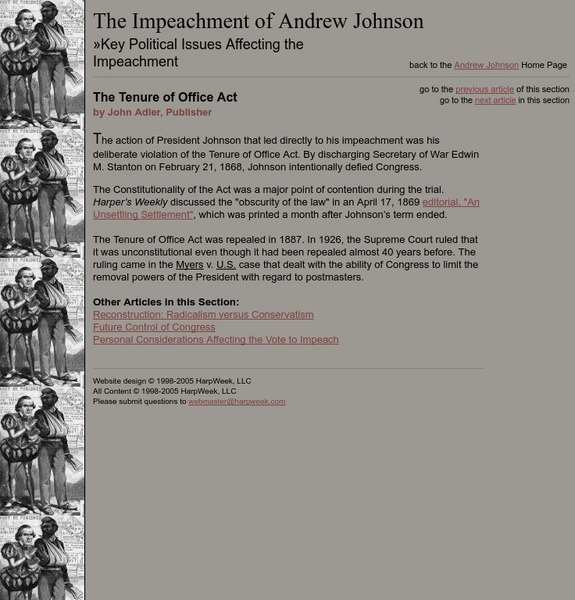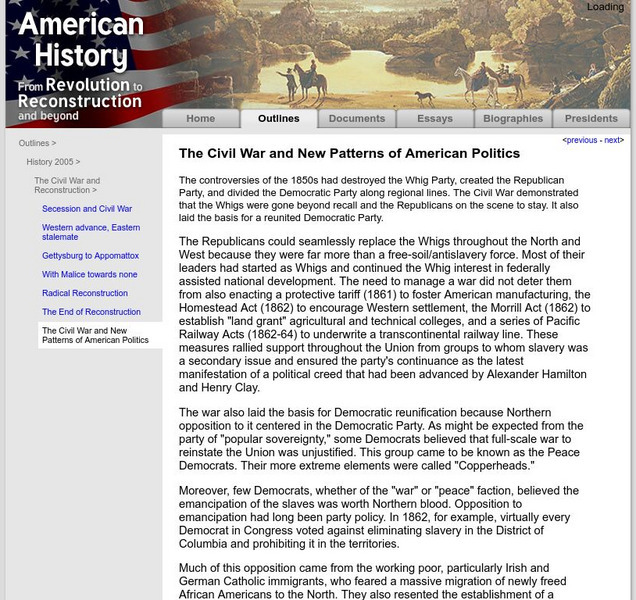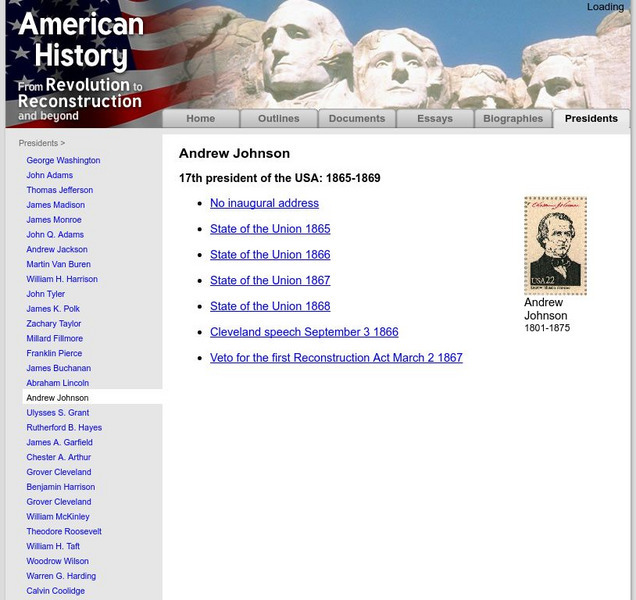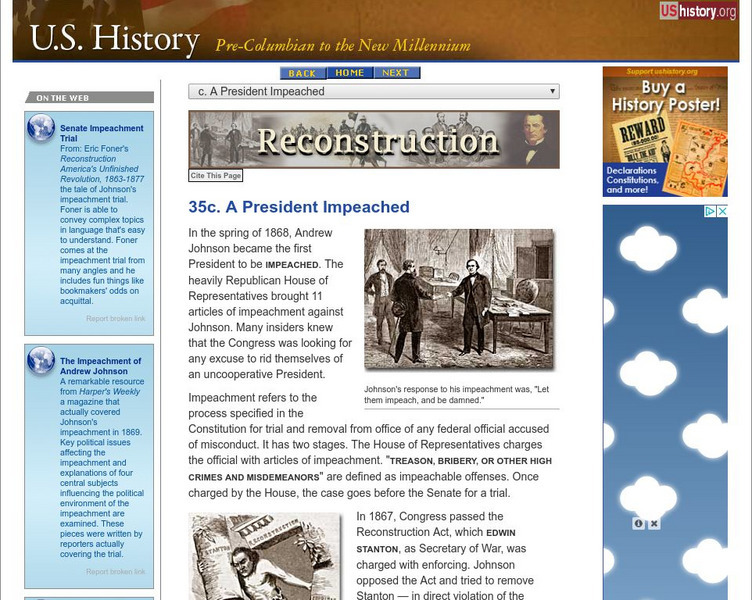Hi, what do you want to do?
Khan Academy
Khan Academy: Ap Us History: 1844 1877: Reconstruction: The Compromise of 1877
Discusses the Compromise of 1877 which gave the presidency to Rutherford B. Hayes and signaled the end of Reconstruction in the South. As a result of this act, federal troops withdrew from the South, and Jim Crow laws were passed by...
University of Groningen
American History: Essays: The Sugar and Stamp Acts
Reasons for the Sugar Act and the Stamp Act are briefly described. The article also describes the colonial assemblies' reasons for fearing and speaking out against these taxes. The biggest question, Parliament's right to tax the...
University of Groningen
American History: Documents: Excerpts From "The Fugitive Slave Act"
This site titled, "From Revolution to Reconstruction," provides excerpts from the text of the Fugitive Slave Act of 1850, part of the Compromise of 1850.
University of Groningen
American History: Outlines: Townshend Acts
Overview of the tax on goods imported to the colonies known as the Townshend Acts sparking protest in the colonies.
Teaching American History
Teaching American History: Document Library: Civil Rights Act of 1866
Read the complete text of the Civil Rights Act of 1866, which set out guarantees for citizenship in post-Civil War America as well as the punishments for those who tried to obstruct these guarantees.
University of Groningen
American History: Outlines: Stamp Act
This site has the brief history and background of the Stamp Act of 1765 provided for by the University of Groningen.
University of Groningen
American History: Essays: The Iron Horse: The Interstate Commerce Act
From a lengthy essay on the history of the railroad in the United States. This section describes The Interstate Commerce Act that passed in 1887. Its purpose was to regulate railroad rates across states, and it mandated the formation of...
University of Groningen
American History: Essays: The Federal Reserve Act (1913)
This resource presents information about the Federal Reserve Act, which created the Federal Reserve System in 1913. It is part of a larger article on central banking in the U.S.
University of Groningen
American History: Essays: Politics and Sectionalism: Kansas Nebraska Act
Discusses what led up to the Kansas-Nebraska Act of 1854, and the role Illinois Senator Stephen Douglas played in developing it.
State Library of North Carolina
N Cpedia: Convention of 1868
Read about the Convention of 1868, which was a direct result of the Radical Congressional Reconstruction Acts passed in 1867, overturning post-Civil War Presidential Reconstruction.
Digital History
Digital History: President Johnson Impeached [Pdf]
No love was lost between the Congress' trying to pass Reconstruction plans and President Andrew Johnson's attempts to thwart those plans. Read a short biography of Andrew Johnson to get an idea of the man. Follow the timeline of...
Siteseen
Siteseen: American Historama: Civil Rights Act of 1875
Learn about the Civil Rights Act of 1875 that extended the fundamental guarantees of the Constitution to protect all citizens in their civil and legal rights.
Siteseen
Siteseen: American Historama: Civil Rights Act of 1866
The purpose of the Civil Rights Act of 1866 was to protect ex-slaves (Freedmen) from legislation in the Southern States such as the Black Codes and the Vagrancy Laws and help African Americans obtain equal status under the law.
Civil War Home
Home of the American Civil War: The Kansas Nebraska Act
Provides information on the Kansas-Nebraska Act and the consequences of its passing. From "The Civil War and Reconstruction" by Randall and McDonald.
Other
Harp Week: Impeachment of Andrew Johnson: Tenure of Office Act
This site from HarpWeek contains information on the impeachment of Andrew Johnson because he violated the Tenure of Office Act. The site is not too in-depth but it does provide some interesting information.
University of Virginia
Miller Center at Uva: u.s. Presidents: Ulysses S. Grant: Domestic Affairs
A very good look at the many parts of domestic affairs in the Grant administration. Grant dealt with Reconstruction, the Panic of 1873, a revamping of the government's relationship with Native Americans, and several scandals that did not...
University of California
History Project: Political Issues Behind the Trial of President Andrew Johnson
High school lesson provides the background for the impeachment trial of President Andrew Johnson over the conflict between Congress and the President over Reconstruction of the South. Learners are to use sections from 15 primary source...
Digital History
Digital History: The Problem of Reconstruction [Pdf]
How does a country put itself back together after a civil war? Read about the problems with the destruction of the Southern economy and land, the recognition of former slaves as freedmen, and the ways to bring the Southern states back...
University of Groningen
American History: Outlines: The Civil War and New Patterns of American Politics
Overview of the new political patterns which developed as a result of the Civil War and Reconstruction.
University of Groningen
American History: Presidents: Andrew Johnson: 17th President
Page containing links to primary source text of Andrew Johnson's speeches, including State of the Union 1866-1868, Cleveland Speech and a speech made to the House of Representatives on his position to veto the first Reconstruction Act.
Siteseen
Siteseen: American Historama: Enforcement Acts
The purpose of the Enforcement Acts was to implement and extend the fundamental guarantees of the Constitution to all citizens and protect ex-slaves from violence carried out by the Ku Klux Klan.
University of Groningen
American History: Outlines: Outline of American History Coercive Acts
This essay provides information about the First Continental Congress which was called as a result of the passage of the Coercive Acts.
University of Groningen
American History: Documents: The Maryland Toleration Act
This site discusses the actual effects of the Maryland Toleration Act. Clicking on "Text" will take you to the original document.
Independence Hall Association
U.s. History: A President Impeached
The Radical Republicans in Congress did not approve of President Andrew Johnson's attempts to thwart their plans for Reconstruction. See what charges they used to impeach Johnson and find out why he was not removed from office.






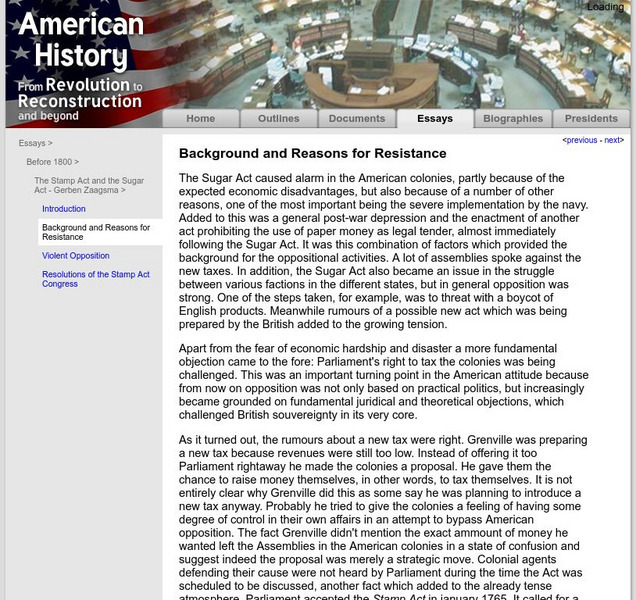


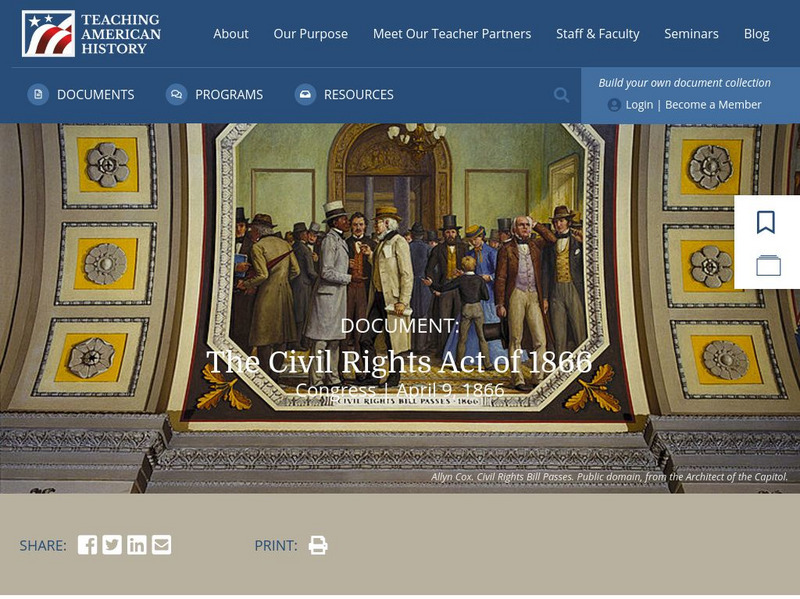


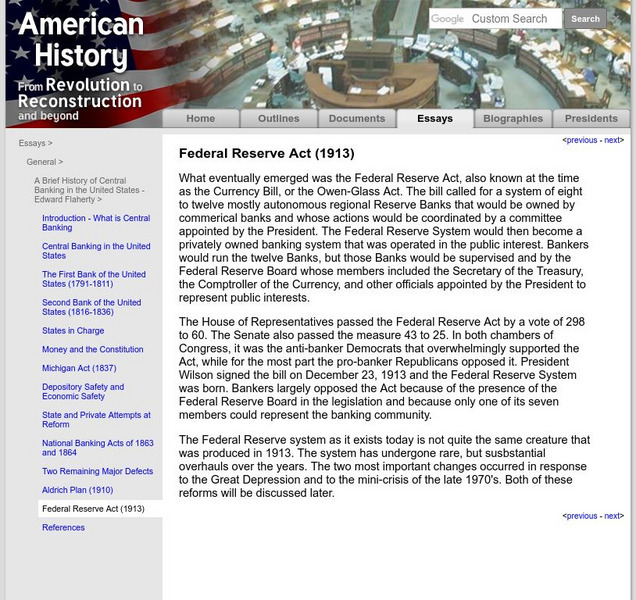

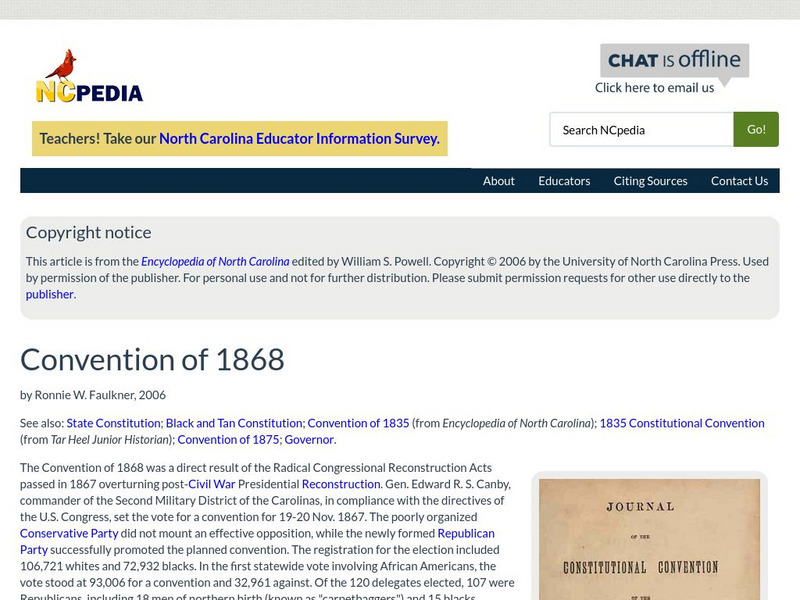
![Digital History: President Johnson Impeached [Pdf] Website Digital History: President Johnson Impeached [Pdf] Website](https://static.lp.lexp.cloud/images/attachment_defaults/resource/large/FPO-knovation.png)



